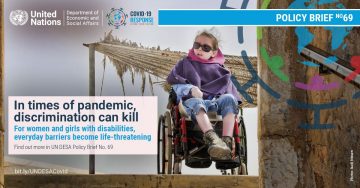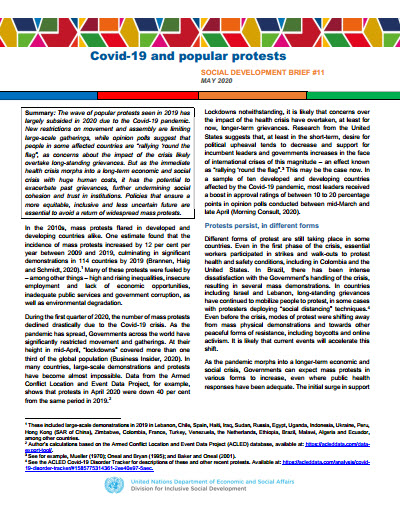Publications
Displaying 11 - 20 of 40
Policy Briefs |
Persons with disabilities—both visible and invisible—face obstacles and discrimination in accessing health care and other essential services, social protection and income security, mental health services, and communication technologies. In addition, women and girls with disabilities are subject to intersecting forms of discrimination related to sexual and reproductive health, gender-based violence, legal protection, unpaid care and domestic work. Women and girls with disabilities who are migrants, refugees, or from ethnic minorities endure even more hardships and unequal treatment. Gender, disability and structural inequalities, which characterized societies before the crisis, are being…
Social Policy Briefs |
The wave of popular protests seen in 2019 has largely subsided in 2020 due to the Covid-19 pandemic. New restrictions on movement and assembly are limiting large-scale gatherings, while opinion polls suggest that people in some affected countries are “rallying ‘round the flag”, as concerns about the impact of the crisis likely overtake long standing grievances. But as the immediate health crisis morphs into a long-term economic and social crisis with huge human costs, it has the potential to exacerbate past grievances, further undermining social cohesion and trust in institutions. Policies that ensure a more equitable, inclusive and less uncertain future are essential to avoid a return of…
Social Development Briefs |
The wave of popular protests seen in 2019 has largely subsided in 2020 due to the Covid-19 pandemic. New restrictions on movement and assembly are limiting large-scale gatherings, while opinion polls suggest that people in some affected countries are “rallying ‘round the flag”, as concerns about the impact of the crisis likely overtake long standing grievances. But as the immediate health crisis morphs into a long-term economic and social crisis with huge human costs, it has the potential to exacerbate past grievances, further undermining social cohesion and trust in institutions. Policies that ensure a more equitable, inclusive and less uncertain future are essential to avoid a return of…
Policy Briefs |
COVID-19 presents a new threat to the health and survival of indigenous peoples. Indigenous peoples often experience widespread stigma and discrimination in healthcare settings such as stereotyping and a lack of quality in the care provided, thus compromising standards of care and discouraging them from accessing health care.
Policy Briefs |
Countries are quickly acting to counter its negative impact on employment and poverty, including through fiscal stimulus plans. Whether these plans will protect the most disadvantaged people and households over the long-term depends on their size, duration and on how measures are implemented.
Social Policy Briefs |
Recent evidence suggests that labour markets are becoming increasingly polarized (World Bank, 2016; Breemersch, Damijan and Konings, 2017; Goos, Manning and Salomons, 2010; Autor, 2010). Middle-skill occupations are losing ground compared to low- and high-skill occupations. Skill-biased technological change, off-shoring, deindustrialization, import competition and labour market institutions are often cited as driving factors. This trend has, to an extent, contributed to the rise in income inequality observed in many countries as argued in the World Social Report 2020.
The discussion on polarization is often focused on the experience of developed countries, but there is some evidence that a…
Social Development Briefs |
Recent evidence suggests that labour markets are becoming increasingly polarized (World Bank, 2016; Breemersch, Damijan and Konings, 2017; Goos, Manning and Salomons, 2010; Autor, 2010). Middle-skill occupations are losing ground compared to low- and high-skill occupations. Skill-biased technological change, off-shoring, deindustrialization, import competition and labour market institutions are often cited as driving factors. This trend has, to an extent, contributed to the rise in income inequality observed in many countries as argued in the World Social Report 2020.
The discussion on polarization is often focused on the experience of developed countries, but there is some evidence that a…
Publication |
The World Social Report 2020 examines the impact of four such megatrends on inequality: technological innovation, climate change, urbanization and international migration. Technological change can be an engine of economic growth, offering new possibilities in health care, education, communication and productivity. But it can also exacerbate wage inequality and displace workers. The accelerating winds of climate change are being unleashed around the world, but the poorest countries and groups are suffering most, especially those trying to eke out a living in rural areas.
Urbanization offers unmatched opportunities, yet cities find abject poverty and opulent wealth in close proximity, making…
Flagship Reports |
The challenge of inequality in a rapidly changing world
The World Social Report 2020 examines the impact of four such megatrends on inequality: technological innovation, climate change, urbanization and international migration. Technological change can be an engine of economic growth, offering new possibilities in health care, education, communication and productivity. But it can also exacerbate wage inequality and displace workers. The accelerating winds of climate change are being unleashed around the world, but the poorest countries and groups are suffering most, especially those trying to eke out a living in rural areas. Urbanization offers unmatched opportunities, yet cities find…
UN General Assembly Reports on Social Development |
 Welcome to the United Nations
Welcome to the United Nations








